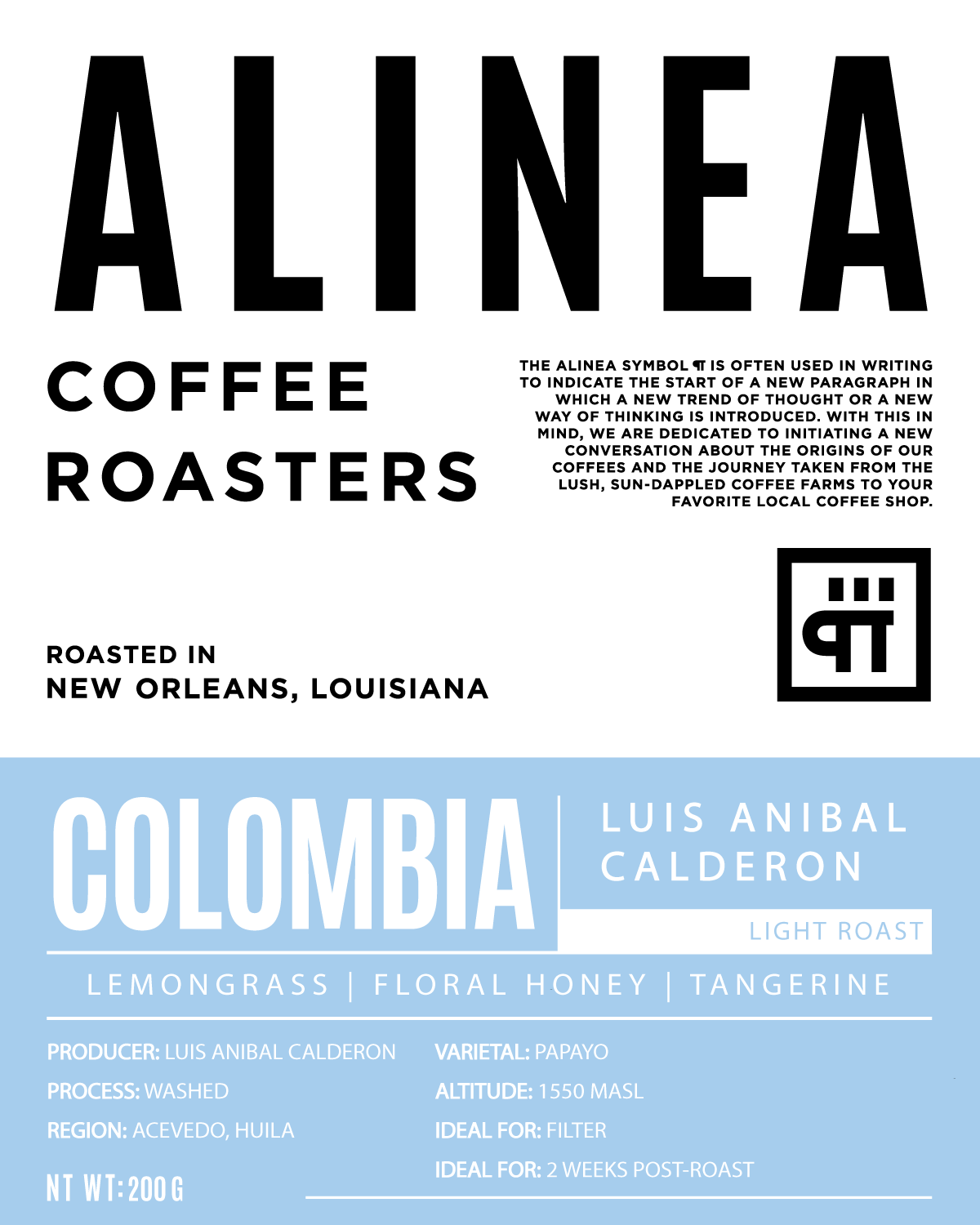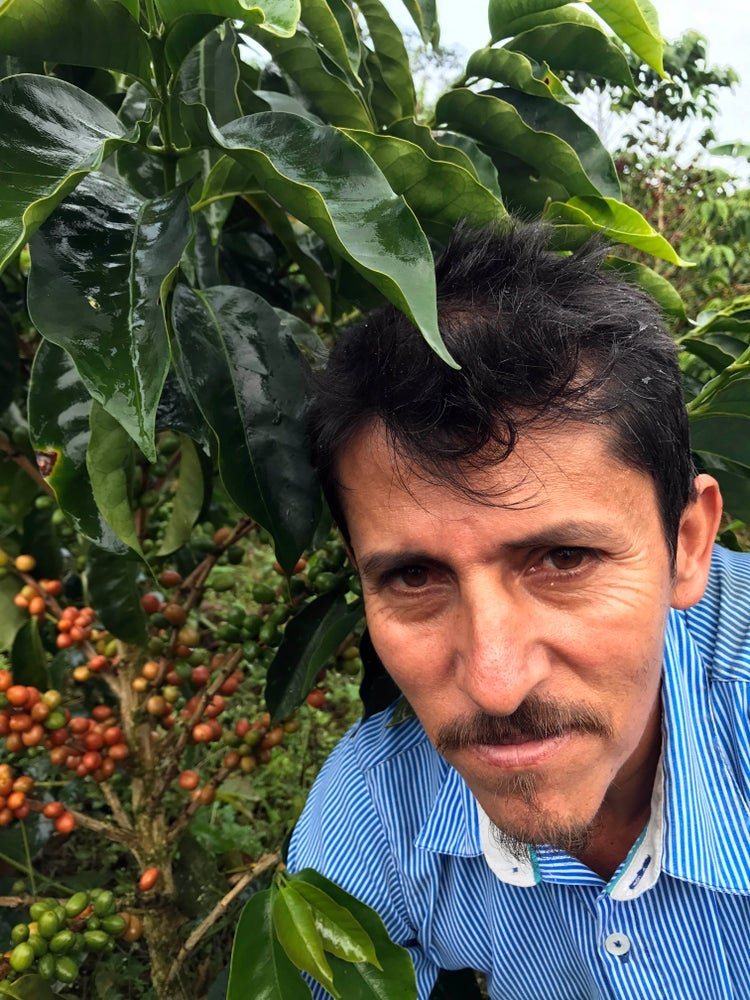 Image 1 of 2
Image 1 of 2

 Image 2 of 2
Image 2 of 2



Colombia | Luis Anibal Calderon Papayo
Lemongrass | Tangerine | Orange Blossom Honey
Producer: Luis Anibal Calderon
Farm: Finca Villa Betulia
Process: Washed
Region: Acevedo, Cauca
Varietal: Papayo
Altitude: 1550 masl
Best After: 2 Weeks Off-Roast
We’re excited to release our first ever papayo varietal from elite producer Luis Anibal Calderon of Finca Villa Betulia located in Acevedo of the Cauca region in Colombia. Papayo is one of several enigmatic coffee varieties that have surfaced across Latin America in recent years. The origin story tends to follow a familiar pattern: a farmer notices a few unusual coffee plants—often assuming they're natural mutations of caturra or bourbon, depending on the plant’s size—and decides to separate them during harvest. The resulting cup quality turns out to be exceptional. Eventually, genetic testing reveals that the variety isn’t caturra or bourbon at all, but instead shares recent lineage with Ethiopian landraces.
It’s a narrative we’ve heard before—not just with Gesha, but also with varieties like Chiroso, Pink Bourbon, Ají Bourbon, Catiope, Mejorado, and Wush Wush (though some claims deserve healthy skepticism). Papayo, specifically, was first identified in Colombia’s Huila department, near the town of Acevedo. The plants grow tall like bourbon and are highly productive, bearing clusters of elongated fruit that resemble miniature papayas—hence the name.
The Farm
Back in 2011, Luis faced the real possibility of losing his farm to the bank. At the time, he was selling his coffee on the C-market, where prices barely covered production costs—let alone allowed him to repay the loan he’d taken out to expand his farm. In a pivotal moment, Luis turned to his local Specialty Coffee Association. They offered him 15% above the C-price—still not enough to truly reflect the extra effort required for producing specialty-grade coffee, but it was sufficient to keep Luis afloat and spark his interest in this part of the industry. Encouraged, Luis planted 5,000 Gesha trees in 2012. After three long years of nurturing them, the trees finally bore fruit—and with that, Luis was fully convinced of the potential in specialty coffee. By 2015, he had committed to transforming his entire farm to focus on exotic coffee varieties.
Today, Finca Villa Betulia stands as a benchmark for specialty coffee in Acevedo, Huila. His farm is home to an impressive array of cultivars, including Red Gesha, Tabi, Red and Yellow Bourbon, Java, Sidra, Striped Bourbon, Chili Bourbon, Caturra, Typica, Maragogype, Pacamara, Marageisha, Pink Bourbon, Papayo, Caturron, Liberica, Variedad Colombia, Castillo, Red Leaf, Dwarf Gesha, Pink Gesha, Yellow Gesha, Wush Wush, Dwarf Yellow Bourbon, Mokka, and Maracaturra. With the support of Cofinet, Luis has also refined his processing techniques for high-end micro-lots. He has become highly skilled in a variety of methods, including extended fermentation, honey, and natural processes.
What to Expect:
This offering tastes best 2-4 weeks off of roast and we highly recommend letting it rest for optimal flavor expression. We are tasting lemongrass and floral honey witha a tangerine-like acidity and sweetness. As the cup cools, you will taste a light pineapple note reminiscent in a lot of papayo varietals.
Brewing Recommendations:
Filter: We recommend a cone-shaped brewer like a v60 to enhance clarity while allowing for a nice complexity with a separation of flavors.
Espresso: This coffee tastes best as espresso around 4 weeks off-roast with a wider 1:3 ratio in about 23-25 seconds to open the coffee up and mute the acidity.
Lemongrass | Tangerine | Orange Blossom Honey
Producer: Luis Anibal Calderon
Farm: Finca Villa Betulia
Process: Washed
Region: Acevedo, Cauca
Varietal: Papayo
Altitude: 1550 masl
Best After: 2 Weeks Off-Roast
We’re excited to release our first ever papayo varietal from elite producer Luis Anibal Calderon of Finca Villa Betulia located in Acevedo of the Cauca region in Colombia. Papayo is one of several enigmatic coffee varieties that have surfaced across Latin America in recent years. The origin story tends to follow a familiar pattern: a farmer notices a few unusual coffee plants—often assuming they're natural mutations of caturra or bourbon, depending on the plant’s size—and decides to separate them during harvest. The resulting cup quality turns out to be exceptional. Eventually, genetic testing reveals that the variety isn’t caturra or bourbon at all, but instead shares recent lineage with Ethiopian landraces.
It’s a narrative we’ve heard before—not just with Gesha, but also with varieties like Chiroso, Pink Bourbon, Ají Bourbon, Catiope, Mejorado, and Wush Wush (though some claims deserve healthy skepticism). Papayo, specifically, was first identified in Colombia’s Huila department, near the town of Acevedo. The plants grow tall like bourbon and are highly productive, bearing clusters of elongated fruit that resemble miniature papayas—hence the name.
The Farm
Back in 2011, Luis faced the real possibility of losing his farm to the bank. At the time, he was selling his coffee on the C-market, where prices barely covered production costs—let alone allowed him to repay the loan he’d taken out to expand his farm. In a pivotal moment, Luis turned to his local Specialty Coffee Association. They offered him 15% above the C-price—still not enough to truly reflect the extra effort required for producing specialty-grade coffee, but it was sufficient to keep Luis afloat and spark his interest in this part of the industry. Encouraged, Luis planted 5,000 Gesha trees in 2012. After three long years of nurturing them, the trees finally bore fruit—and with that, Luis was fully convinced of the potential in specialty coffee. By 2015, he had committed to transforming his entire farm to focus on exotic coffee varieties.
Today, Finca Villa Betulia stands as a benchmark for specialty coffee in Acevedo, Huila. His farm is home to an impressive array of cultivars, including Red Gesha, Tabi, Red and Yellow Bourbon, Java, Sidra, Striped Bourbon, Chili Bourbon, Caturra, Typica, Maragogype, Pacamara, Marageisha, Pink Bourbon, Papayo, Caturron, Liberica, Variedad Colombia, Castillo, Red Leaf, Dwarf Gesha, Pink Gesha, Yellow Gesha, Wush Wush, Dwarf Yellow Bourbon, Mokka, and Maracaturra. With the support of Cofinet, Luis has also refined his processing techniques for high-end micro-lots. He has become highly skilled in a variety of methods, including extended fermentation, honey, and natural processes.
What to Expect:
This offering tastes best 2-4 weeks off of roast and we highly recommend letting it rest for optimal flavor expression. We are tasting lemongrass and floral honey witha a tangerine-like acidity and sweetness. As the cup cools, you will taste a light pineapple note reminiscent in a lot of papayo varietals.
Brewing Recommendations:
Filter: We recommend a cone-shaped brewer like a v60 to enhance clarity while allowing for a nice complexity with a separation of flavors.
Espresso: This coffee tastes best as espresso around 4 weeks off-roast with a wider 1:3 ratio in about 23-25 seconds to open the coffee up and mute the acidity.
